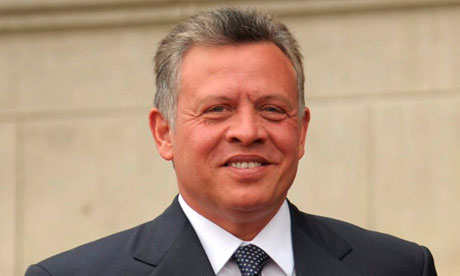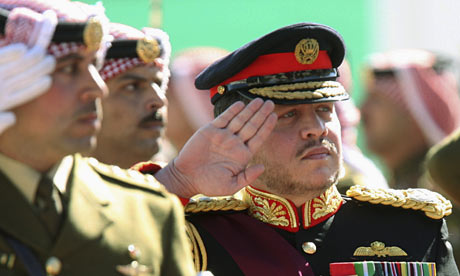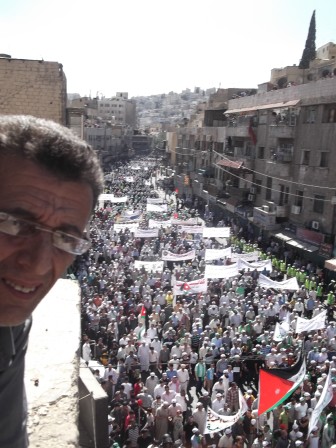Tension Rises Over Long-delayed Reformsإصلاحات صرح عنها الملك طال انتظارها وجرى تأخيرها كثيرا
Jordan's king calls early elections as tension rises over long-delayed reforms
King Abdullah set to appoint fifth prime minister since start of Arab spring as opposition prepares for protest

King Abdullah of Jordan, a country which has largely been spared the drama of recent events elsewhere in the Middle East. Photograph: Raul Garcia/EPA
Jordan is facing new political uncertainty after King Abdullah decided to dissolve parliament and call early elections against a background of rising tensions over long-delayed reforms.
The move was announced on the eve of what had been billed as a potentially violent confrontation between the Islamist-led opposition and government supporters at rival rallies in Amman on Friday.
Late on Thursday the pro-government side decided to postpone its rally, apparently on official advice. Opposition supporters had accused the authorities of deliberately organising a showdown.
The Islamic Action Front, the Jordanian branch of the Muslim Brotherhood, is expecting to get 50,000 supporters out for the biggest opposition protest yet seen in the western-backed monarchy.
The IAF has insisted that it will boycott the polls to protest against the lack of reform. It is demanding a parliamentary system where the prime minister is elected rather than chosen and dismissed by the king.
"We are talking about a new phase after 20 months of continued popular protests and unwillingness to listen to our demands for reform," Zaki Bani Rusheid, the deputy head of the Muslim Brotherhood, told Reuters. "We are calling for real reforms that restore power to Jordanian people."
Under Jordan's constitution the cabinet must resign within a week of parliament's dissolution. That means the king will be appointing another prime minister – his fifth since the Arab spring began. Jordanians joke wryly about the king playing musical chairs but doing little else.
Changes to the electoral system have failed to satisfy critics, who complain that it remains unrepresentative and weighted against the estimated 60% of Jordanians who are of Palestinian origin.
A study by Fikra, an online forum that aims to support Arab democrats "in their struggle with authoritarians", shows that the governate of Kerak, which has a population of 200,000, is represented by 10 MPs, while the 1 million people in Zarqa are represented by only 11 MPs. This unfair distribution of seats between governorates prevents hundreds of thousands from participating in the election.
Jordan has been largely spared the drama of events elsewhere in the region over the past two turbulent years. Demonstrations in March 2011 were contained and protests since have been restricted to outlying areas. Unusually for the Arab world, the government has allowed demonstrations to take place without the use of lethal force.
Talk of reform has now been accompanied by four changes of prime minister. The last prime minister, Awn Khasawneh, resigned when the palace insisted he was moving too slowly. The other view is that he was getting too cosy in talks with the IAF. The outgoing incumbent, Fayez Tarawneh, was only ever seen as a stopgap.
The IAF has been emboldened by the successes of the Muslim Brotherhood in Egypt and Tunisia and by the prominent role it is playing in the uprising in Syria.
In private, Jordan's western friends are becoming increasingly nervous about the slow pace of change and the prickliness of the palace in the face of opposition. Expectations of change have risen as criticism of the monarchy has become bolder. The king has also been having unaccustomed problems with his most loyal constituency, the east Jordanian tribes, as the cash to pay for public sector jobs runs out.
• This article was amended on 5 October 2012 because the original said King Abdullah of Jordan sacked the country's last prime minister, Awn Khasawneh.
Is Jordan about to experience its first big moment of the Arab spring?
Protests planned in Amman could see confrontation between opposition and loyalists, writes Ian Black

Jordan's King Abdullah reviews Bedouin guards of honour in Amman, 2006. Photograph: Ali Jarekji/Reuters
Amman, Jordan's capital, has been largely spared the drama of events elsewhere in the Arab world over the past two years. Demonstrations in March 2011 were contained and protests since have been restricted to outlying areas - albeit in loyal East Bank heartlands such as Tafila and Ma'an. Talk of reform has been accompanied by three changes of prime minister. King Abdullah's last one, Awn Khasawneh, resigned after complaints by the palace that he was not moving fast enough. The other view is that he was getting too cosy in talks with the Islamic Action Front - the Jordanian branch of the Muslim Brotherhood.
So is Arab spring unrest about to hit the Hashemite kingdom? On Friday the IAF is organising a big rally under the resonant slogan "Save the Homeland." Its target is the constitutional changes the king has approved in advance of parliamentary elections he says must be held by the end of the year — though the increasingly vocal IAF says the reforms are inadequate and insists it will boycott the polls. That would render them meaningless.
The IAF has been emboldened by the successes of the Muslim Brotherhood in Egypt and Tunisia and by the prominent role it is playing in the uprising in Syria next door. Complicating matters, many of its supporters are Jordanians of Palestinian origin, always a sensitive issue, as is the peace treaty with Israel. The Obeidat, a large East Bank clan, has just disowned one of its members who has accepted the post of Jordanian ambassador to Tel Aviv.
The king is under pressure from his western friends to respond convincingly to growing demands for change. Crucially, though, he plans to retain the power to appoint the prime minister and dismiss parliament at will. Overall the proposed new electoral system is still rigged in favour of regime supporters; Palestinian-Jordanians in particular will be significantly under-represented. Critics complain that reforms are more apparent than real.
Talk has been rife of a showdown on Friday — and perhaps a violent one. Young thugs wearing T-shirts emblazoned with the king's image have been mobilised for a loyalist counter-demonstration and there are signs of an offically-inspired whispering campaign suggesting that the IAF will call on Abdullah to surrender power. It insists it is doing no such thing. The popular slogan the "people demand the fall of the regime" has barely been heard in the Hashemite kingdom.
In recent months there has been widespread unease because of the crisis in Syria, a serious financial squeeze, a row over the removal of fuel subsidies and anger about new restrictions on the internet. The once iron-clad taboo on criticism of the royal court has been eroded.
The IAF rally is to be held on the familiar "safety-valve" route from the al-Hussein mosque in downtown Amman to nearby al-Nakhil square. Loyalists were planning to oppose it under the banner of "Alleigance and Belonging." Several well-known Jordanian commentators have suggested that the government was seeking a confrontation with the opposition. According to the latest reports from Amman that counter-demonstration is now to be re-scheduled. That would help avoid a potentially dangerous clash — even if Jordan's underlying tensions remain.
In recent months there has been widespread unease because of the crisis in Syria, a serious financial squeeze, a row over the removal of fuel subsidies and anger about new restrictions on the internet. The once iron-clad taboo on criticism of the royal court has been eroded.
The IAF rally is to be held on the familiar "safety-valve" route from the al-Hussein mosque in downtown Amman to nearby al-Nakhil square. Loyalists were planning to oppose it under the banner of "Alleigance and Belonging." Several well-known Jordanian commentators have suggested that the government was seeking a confrontation with the opposition. According to the latest reports from Amman that counter-demonstration is now to be re-scheduled. That would help avoid a potentially dangerous clash — even if Jordan's underlying tensions remain.
• This article was amended on 5 October 2012 because the original said King Abdullah of Jordan sacked the country's last prime minister, Awn Khasawneh.
لا تتركوهم يفسدون الانتخابات
15/10/2012
فهد الخيطان
تختتم اليوم المرحلة الأولى والأساسية من
مراحل العملية الانتخابية، والمتمثلة في إنجاز سجل جديد ونظيف للناخبين. لم تكن العملية
سهلة على الهيئة المستقلة للانتخاب، والتي واجهت التحدي فور تأسيسها وسط حالة من انعدام
الثقة الشعبية بالانتخابات. لكن علينا أن نقر اليوم أنه رغم بعض التجاوزات البسيطة
التي رافقت عملية التسجيل، إلا أن الهيئة المستقلة تمكنت وبنجاح من إنجاز المهمة وفق
أفضل المعايير الدولية.
وكان للإدارة النزيهة والشفافة من جانب
"الهيئة"، والرقابة الموضوعية التي قام بها تحالف "راصد"، الدور
الحاسم في تحفيز الناخبين على التسجيل، إلى أن تعدى العدد حاجز المليونين.
لكن هذه المرحلة على أهميتها ليست سوى محطة
على طريق طويلة لاستعادة النزاهة المفقودة في العملية الانتخابية. وإقبال أكثر من مليوني
مواطن على التسجيل لا يعني أبدا ضمان مشاركتهم في الانتخابات، إذا لم تلتزم الأطراف
المعنية بضمانات النزاهة في جميع مراحل العملية الانتخابية.
إن أخطر تحد يواجه الانتخابات هذه المرة
لا يتأتى من الدولة وأجهزتها كما حصل في انتخابات سابقة، وإنما من تساهل هذه الأجهزة
مع التجاوزات من طرف المرشحين، والتي تظهر مؤشرات قوية عليها منذ الآن.
منذ الأيام الأولى للتسجيل، سُجلت محاولات
لمرشحين محتملين لشراء البطاقات من الناخبين وحجزها. ورغم الجهود التي بذلتها
"الهيئة"، إلا أن هؤلاء تمكنوا بالفعل من حجز آلاف البطاقات، سواء بمعرفة
أصحابها أو باستخراجها واستلامها دون علمهم. في الحالتين، نحن أمام خرق فاضح للقانون
يستدعي معاقبة مرتكبيه.
وفي أكثر من محافظة، يتحرك مرشحون وجماعات
حزبية مدعومة من رجال أعمال، بشكل شبه علني، لجمع بطاقات الناخبين وحجزها لديهم إلى
أن يحين موعد الاقتراع، مقابل مبالغ مالية تعطى على دفعتين.
مثل هذه التجاوزات مرشحة للاتساع في الأسابيع
المقبلة، إذا ما تُركت دون إجراءات رادعة واستباقية.
لا تملك الهيئة المستقلة للانتخاب قوات
أمن خاصة بها لتداهم بيوت المرشحين ومكاتبهم، لكن القانون يفرض على الأجهزة الأمنية
التصدي لكل محاولات التعدي على القانون، سواء كان بالتنسيق مع "الهيئة" أو
بدونه. فرجال الأمن، وبحكم عملهم، يتواجدون بين الناس سرا وعلنا، وهم دون غيرهم القادرون
على ملاحقة عمليات شراء البطاقات وإحباطها، والقبض على المتورطين فيها.
في انتخابات 2010، تساهلت الجهات الرسمية،
وبشكل مقصود، مع ظاهرة شراء الأصوات. وأقر أحد المسؤولين بذلك بحجة أن ملاحقة الظاهرة
ستؤثر سلبا على نسبة الاقتراع! عذر أقبح من ذنب فعلا.
إنقاذ سمعة الانتخابات يحتاج في هذه الدورة
إلى جهود استثنائية، ملموسة ومبكرة، لكي يتأكد المواطن وبالدليل القاطع، أن الدولة
جادة في وعدها بإجراء انتخابات حرة ونزيهة. والدليل ليس أقل من رؤية أحد "حيتان
المرشحين" مكبلا بالقيود بعد ضبطه متورطا بحجز البطاقات وشراء الأصوات.
ولن يقبل مواطن أعذارا كالتي كنا نسمعها
عن عدم توفر الأدلة وما شابه من تصريحات لمسؤولين في السابق، ألقوا بمسؤولية ضبط المخالفين
للقانون على كاهل المواطن، لأننا ببساطة نعرف المتورطين ويعرفهم المسؤولون بالاسم والعنوان.

.jpg)


تعليقات